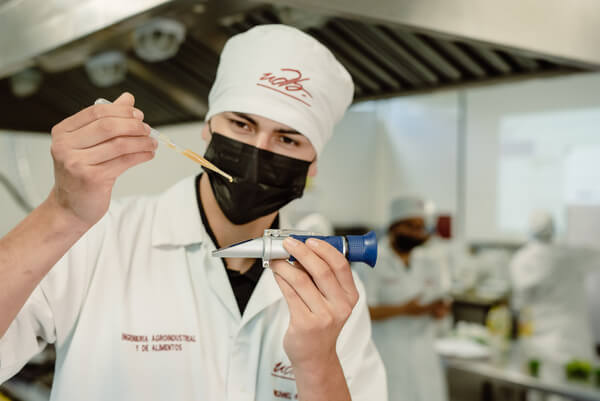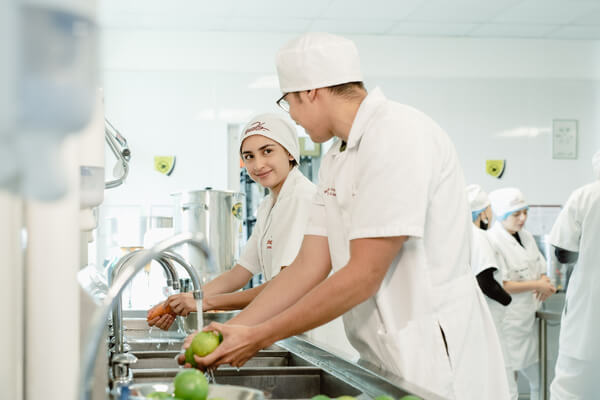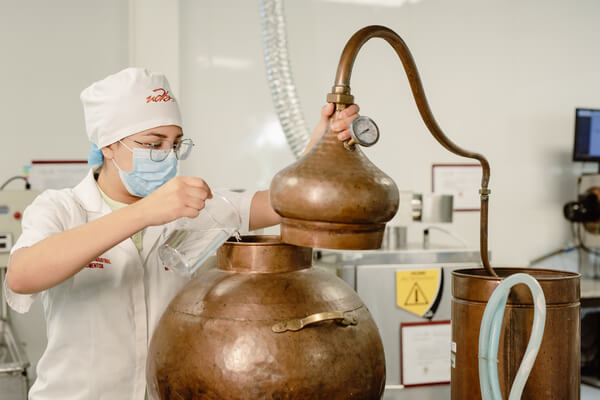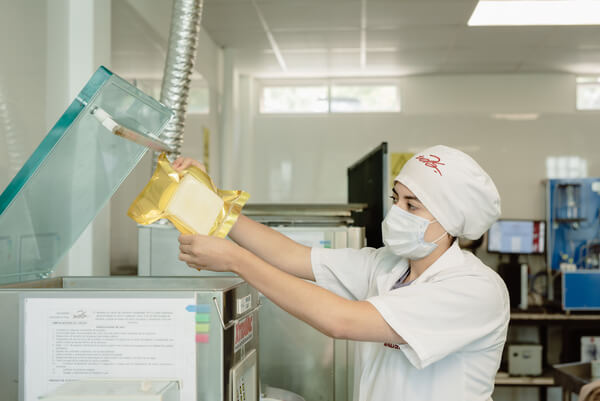Title : Bachelor in Agroindustrial Engineering
Duration: 9 semesters
Modality: On site
** The curriculum may be subject to changes.
As a Bachelor in Agroindustrial engineering you will be a professional in the field of agribusiness and food production with the necessary skills to successfully become part of the business sector in the areas of process and product innovation with the vision of meeting the industry’s needs in terms of technical requirements in the food transformation phases.
Graduates are prepared to take on the challenges that arise in supply chain and traceability to generate the transformation of raw materials to finished products while meeting quality and productivity standards. In this process, they are fully aware of the international regulations and certifications required to perform adequate work in the areas of logistics, distribution, marketing, and product exports according to guidelines of integrated management systems, with emphasis on product safety.
- Opportunities for obtaining certifications and training in international standards (ISO 9001 Quality, ISO 45001 Occupational Safety, GMP Good Manufacturing Practices, Supply Chain, HACCP Hazard Analysis and Critical Control Points, Flexsim, Bizagi Studio, Lean Six Sigma). Agreements with national and international agribusiness and food companies open for visits and pre-professional internships.
- Biochemistry, food analysis, microbiology, industrial chemistry, sensory analysis, product design and development, food processing, among others. Practices in the Nono Experimental Farm, which has 123,55 acres with greenhouses, pilot processing plants that functions as a learning, research, experimentation, and production center.
- Faculty with extensive national and international business experience. Existing agreements with foreign universities for student exchanges in: United States, Holland, Spain, Mexico, Brazil, Chile, among others. We are the only Ecuadorian university accredited in the United States by WSCUC (Western Association of School and Colleges Senior College and University Commission).
- Basic knowledge of chemistry and biology.
- An interest in agribusiness and production.
- Good attitude for entrepreneurship and critical thinking.
- A business idea.
- You will develop your own business idea and entrepreneurial attitude.You will have direct contact with the field, raw materials and food processing. You will learn about marketing, finance and agribusiness chains. You will analyze risk and turn it into an agribusiness opportunity.
- You will have access to state-of-the-art technology in laboratories and pilot production plants that will contribute to your training in areas such as: sanitary control, experimental design, product design, plant design, functional foods, biofuels, agrotechnology, production management, supply chain, agribusiness, etc.
- Our educational model is based on practice, which will make you shine in the professional world through the development of products and services. You will cultivate competencies that will help you develop critical thinking, innovation, creativity and global vision.
More than 90% are employed in:
- Food analysis.
- Agroindustrial chain operations.
- Quality control.
- Agroindustrial processes.
- Logistics and distribution.
- Innovation, design, development of products and services.
- Management and design of agro-industrial plants.
- Production management and business operation.
- Entrepreneurship of your own business.
The Agro-industrial Engineer from Universidad de Las Américas is a competent, enterprising professional with an international-global vision who has a solid background to manage agro-productive chains based on technical and economic analysis, with a focus on the pursuit of excellence, innovation, and social commitment.
Graduates will be able to identify, formulate, and solve complex problems using engineering principles, science, and mathematics. They will employ agro-industrial engineering designs to develop solutions to specific needs that take into account global, cultural, social, environmental, and economic factors, as well as public health, safety, and welfare. Graduates will also be able to effectively communicate in front of a diverse range of audiences relevant to the discipline. They will be able to recognize ethical and professional responsibilities in engineering situations and make informed decisions while considering the impact of engineering solutions in global, economic, environmental, and social contexts, all while working effectively in a team whose members exercise leadership, create a collaborative and inclusive environment, set, and achieve goals, and plan tasks. Using engineering judgment, graduates will design and conduct experiments, analyze, and interpret data, and draw conclusions. Finally, they will use appropriate learning strategies to acquire and apply new knowledge when necessary.
The UDLA Agro-industrial Engineer is expected to create, improve, and enrich his knowledge through research; perform with professional ethics; be critical, creative, enterprising, innovative, and capable of solving complex problems in the agro-productive field.
- Develop agro-industrial technologies in various sustainable production chains that guarantee food safety, quality, and security for the population.
- Manage and lead multidisciplinary projects focused on entrepreneurship and development of innovative products and services in the agro-industrial sector.
- Strengthen integral skills and adapt to technological changes through periodic training and continuous learning.
- Add value to organizations by exercising their profession with values and ethical principles.
A graduate of the Agro-industrial Engineering program will be able to:
- Identify, formulate, and solve complex engineering problems by applying principles of engineering, science, and mathematics.
- Apply engineering design to produce solutions that meet specified needs with consideration of public health, safety, and welfare, as well as global, cultural, social, environmental, and economic factors.
- Communicate effectively with a range of audiences.
- Recognize ethical and professional responsibilities in engineering situations and make informed judgments, which must consider the impact of engineering solutions in global, economic, environmental, and societal contexts.
- Function effectively on a team whose members together provide leadership, create a collaborative and inclusive environment, establish goals, plan tasks, and meet objectives.
- Develop and conduct appropriate experimentation, analyze, and interpret data, and use engineering judgment to draw conclusions.
- Acquire and apply new knowledge as needed, using appropriate learning strategies.
This committee addresses issues related to the fulfillment of the educational objectives, degree profile, and other academic aspects linked to the program’s development.
Responsibilities:
- Review the program’s educational objectives, degree profile, student learning outcomes, and plan of study.
- Propose changes or recommendations for the program educational objectives, degree profile, student learning outcomes, and plan of study.
- Review the results of the program’s annual operating plan.
- Review the program review report and action plan.
Committee Structure:
Description | Committee Members |
Dean of the College or its delegate | Diego Buenaño |
Highest authority of the program or its delegate | Pablo Moncayo |
Professor in charge of graduate follow-up | Pablo Cueva |
Faculty | María Elizabeth Mosquera Quelal |
Representatives of employers and/or representatives of professional associations or guilds | Edison Romo Lima |
Max Diaz Erazo | |
Julio De La Calle Pasquel (President) | |
Andrea Gómez Ponce | |
Graduates | Guillermo Ortiz Ramírez |
Rodrigo Caicedo Almeida |
Bachelor Enrollment
| Academic Year | 2018 | 2019 | 2020 | 2021 | 2022 |
| Number of Students | 286 | 284 | 237 | 222 | 166 |
Bachelor Degrees Awarded
| Academic Year | 2018 | 2019 | 2020 | 2021 | 2022 |
| Number of Students | 56 | 46 | 58 | 50 | 60 |
If you are enrolled in another university, you can have your courses recognized through our simulator and study at UDLA.
Apply here






